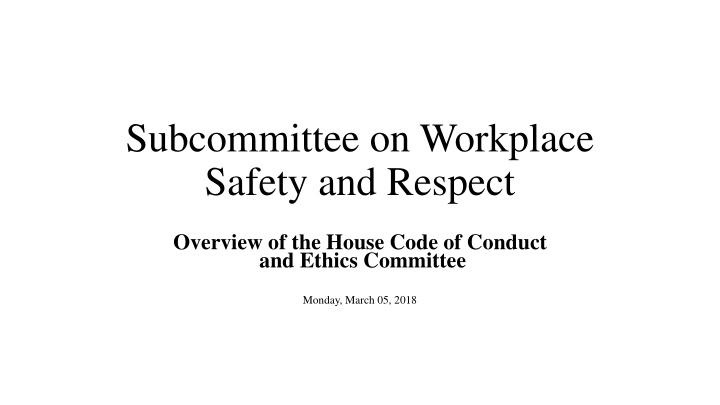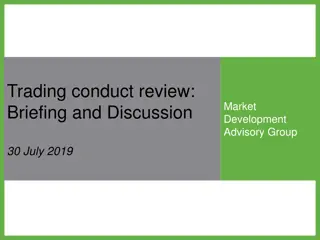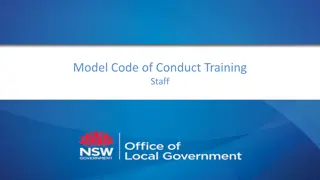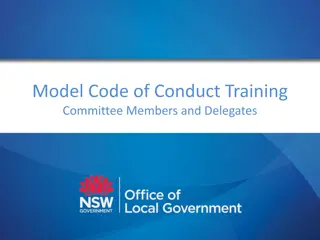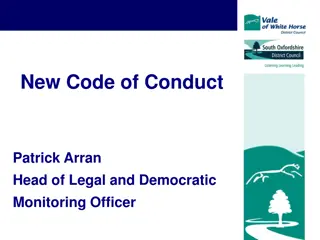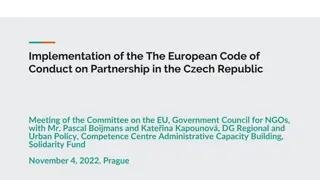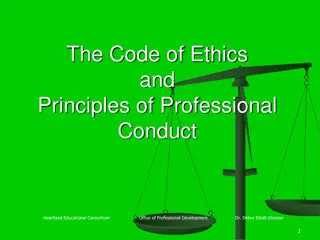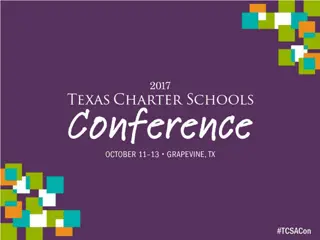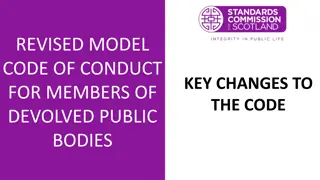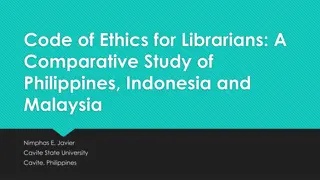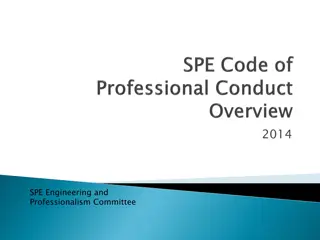Overview of House Code of Conduct, Ethics Committee, and Ethics Procedures
The overview covers the House Code of Conduct focusing on principles of democracy, Ethics Committee membership and procedures for handling complaints, and the jurisdiction of the Ethics Committee, including behavior that could lead to discipline. It also outlines House Rule 6.10 for complaints regarding member conduct, as well as the Ethics Procedures, detailing the process of filing and investigating ethics complaints.
Download Presentation

Please find below an Image/Link to download the presentation.
The content on the website is provided AS IS for your information and personal use only. It may not be sold, licensed, or shared on other websites without obtaining consent from the author.If you encounter any issues during the download, it is possible that the publisher has removed the file from their server.
You are allowed to download the files provided on this website for personal or commercial use, subject to the condition that they are used lawfully. All files are the property of their respective owners.
The content on the website is provided AS IS for your information and personal use only. It may not be sold, licensed, or shared on other websites without obtaining consent from the author.
E N D
Presentation Transcript
Subcommittee on Workplace Safety and Respect Overview of the House Code of Conduct and Ethics Committee Monday, March 05, 2018
Overview of the House Code of Conduct Article 9 of the Permanent Rules of the House: The House adopts the code of conduct when changes are made (last 2007) The code requires House members to uphold certain principles and promote certain goals. Unlike an employment policy, this code of conduct requires adherence to certain principles of democracy and decorum.
Overview of the Ethics Committee Membership: Equal number of members from each party. Committee Rules are adopted that create the procedure to handle complaints. Members may abstain from voting. Members may have closed meetings Executive Session The complaint and the contents of the complaint are public, but if the committee meets in Executive Session their discussion or documents reviewed, including medical records, can be kept confidential. Members and staff are required to keep information confidential.
Ethics Committee Jurisdiction Minnesota Constitution Article IV, 7 Sec. 7. RULES OF GOVERNMENT. Each house may determine the rules of its proceedings, sit upon its own adjournment, punish its members for disorderly behavior, and with the concurrence of two-thirds expel a member; but no member shall be expelled a second time for the same offense. House has jurisdiction over the discipline of members, this is a broad discretion related to any activity of the member including but not limited to: Behavior that could be perceived to violate accepted norms of the House Betraying the public trust Behavior constituting criminal activity
House Rule 6.10 A complaint may be brought about member conduct that: Violates a rule or administrative policy of the House Violates accepted norms of House behavior Betrays the public trust Tends to bring the House into dishonor or disrepute
Ethics ProceduresRule 6.10, cont. An Ethics complaint must be: In writing Signed by two members Given to the member accused The Committee acts in an investigatory capacity and may make recommendations on discipline. The Committee can seek legal advice from outside sources to assist them. The Ethics Committee s recommendations for disciplinary action must be supported by clear and convincing evidence and reported to the House for final disposition.
Due Process and Subpoenas Rights of participants in an Ethics Proceeding: Notice of the complaint Hearing Right to call and cross-examine witnesses Produce evidence The member respondent can refuse to be examined. Rule 6.10 requires all supporting materials to be provided with the initial complaint, chair may allow evidence later, or may require additional documents to be provided in advance. Witnesses and documents may be subpoenaed, Minn. Stat. 3.135, requires 2/3 vote of the committee.
Minnesota Attorney General and House Counsel Generally, the Attorney General s Office does not have a role in Ethics matters as the Minnesota Constitution provides each legislative body authority over the misconduct of its members. House Research acts as counsel to the committee but not to either party to the complaint The committee can also hire outside counsel, with the Speaker s permission Complainants can hire outside counsel Respondents can hire outside counsel
What can the Ethics Committee do to a member? The Ethics Committee recommends discipline to the full House The Ethics Committee may: Find a complaint to be frivolous Find there is a violation of House policies or norms but it was inadvertent or technical and does not warrant discipline Caution a member about a rule or policy Fail to find clear and convincing evidence for disciplinary action
Ethics Committee, discipline cont. Or, the Ethics Committee may find evidence for disciplinary action and recommend final disposition: Censure Reprimand Expulsion Financial restitution Remedial or other action including counseling, training, or other discipline
Other ways members can be disciplined Caucus action: Exclude members from caucus Remove caucus leaders Action by the Speaker (or Minority Leader): Remove members from committees or chair positions Move floor seating Actions outside of the legislature: Criminal and civil liability for crimes or torts Re-election/party discipline Public scrutiny
